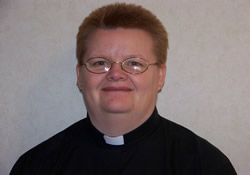Communion, fasting strengthen our souls
“When you come to the table,” says the Rev. Rini Hernandez, “you need to die to yourself and be resurrected through God's grace to a new life.”
The means of grace identified by John Wesley continue to play an important role in the daily life of United Methodists seeking to grow nearer to God and neighbor.
Traditionally separated into two categories – works of piety and works of mercy — the means of grace include such practices as prayer, fasting, Holy Communion, searching the Scriptures, visiting the sick and feeding the hungry.
Typically, practitioners consider fasting and Holy Communion works of piety – actions that help us grow in relationship with God. However, the Rev. Daniel Benedict, former director of worship resources at the General Board of Discipleship, said he thinks Wesley's concept of works of mercy and works of piety should go hand in hand.
"I think they always go together," Benedict said. "Clearly, Jesus links loving God with loving neighbor."
 The Rev. Rinaldo Hernandez
The Rev. Rinaldo HernandezCourtesy photo
In Wesley's words, Holy Communion is "an act of worship ordained by Christ" and a means of grace. This does not mean that we become more worthy of God's grace by participating in Communion. Rather, we open ourselves to the divine love that is already there; we become more ready to receive that love and to respond to it.
The Rev. Rini Hernandez said The Walk to Emmaus, a spiritual formation retreat sponsored by The Upper Room, contributed to his understanding of Holy Communion. He is Southwest District superintendent in the Florida Conference.
"I had the opportunity to reflect a lot on the reason ... we participate in Holy Communion and why it is called a means of grace," he said. "When you come to the table, you need to die to yourself and be resurrected through God's grace to a new life."
Strengthens souls
Wesley referred to this new life in Communion as a way of strengthening our souls. In his sermon, "The Duty of Constant Communion," Wesley taught that Communion confirms the forgiveness of sins and enables believers to leave their sinful behavior.
"As our bodies are strengthened by bread and wine, so are our souls by these tokens of the body and blood of Christ," Wesley wrote. "This is the food of our souls: This gives strength to perform our duty, and leads us on to perfection. If, therefore, we have any regard for the plain command of Christ, if we desire the pardon of our sins, if we wish for strength to believe, to love and obey God, then we should neglect no opportunity of receiving the Lord's Supper."
Hernandez said he thinks it is important for people to understand why they take Holy Communion.
"You are supposed to have a very definite sense of why you are going to the table," he said. "Walk to Emmaus helped me be intentional in coming to the table in a humble fashion, recognizing my weak areas and asking for God's grace to overcome those things. It's a wonderful tool for spiritual growth."
The Rev. Penny Stacy, chaplain at Ohio Health Riverside Methodist Hospital, said she views Communion as a call toward "emptying myself on behalf of God and the church."
"Take in the elements because you've been renewed," she said, "and renewed calls us to act."

The Rev. Penny Stacy
COURTESY PHOTO
Fasting connects
According to Benedict, another means of grace, fasting – or "abstinence," as Wesley sometimes called it – connects us with God and with others. Fasting increases people's awareness of their need for God and, likewise, makes them aware of the needs of others, he said.
"We live out of that, both more intensely into our relationship with God, for whom we hunger," he said, "and in compassion for our neighbors, who are also hungry or who are denied what they need."
Benedict, currently the abbot of the Order of Saint Luke, said people could recognize the internal and external dimensions of fasting by abstaining from something in order to see God and then by giving to others.
"[Abstinence] always has to be appended by a spiritual intention," Benedict said, which "always needs to be spend time with God, experience my hunger and need for God, or it needs to be for the benefit of someone else."
Practicing fasting as a means of grace, Benedict said, sets Christians free from their natural selfish human desires.
"We build our own little worlds, but if we break out of that in abstinence, deny ourselves of that, Christ sets us free in that choice to embrace a means of grace that are the works of mercy – reaching out for the sake of others," he said.
Hernandez views fasting as "a deeper way to go in communication with God when you are deeply looking for answers."
Fasting should always be in connection with prayer, he continued. In his experience, abstaining from food serves as a way to express sincerity to God.
Hernandez regularly fasted in his home country of Cuba, where he served as a church leader for 23 years before moving to the United States in 2001. In Cuba, Hernandez and his family endured hardship due to government pressure against Christians.
"The only way you can survive that is if you have a strong relationship with God through the means of grace with spiritual disciplines like prayer and fasting," Hernandez said.
When church members in Cuba would gather, Hernandez said, they would fast together in an effort to receive God's grace to help them obey God's calling despite the persecution they faced.
"It was something that really marked our lives in a very powerful way," he said.
Asking for grace
In fasting, he continued, "You are asking for a form of grace. That could be healing grace, reconciling grace," he said. "You are asking God to pour out grace on your life to do something or to change something. Through prayer and fasting, you are able to get it. It's a way to ask God for a particular form of grace that you are needing."
Stacy, who is also a deacon at Indian Run United Methodist Church, Dublin, Ohio, views fasting as a practice of personal sacrifice in order to treat others the way Jesus would treat them.
"It's giving up a selfish thing and using that time, energy, money, to bless someone else," she said.
By fasting, Stacy said, people open their minds and hearts to the movement of the Spirit. "I can't hear those things if I'm so caught up in the materialistic world in which we live," she explained.
More than giving something up, fasting is an opportunity, Stacy said, to do something proactive with the time or money one would spend on self-focused things. For example, she suggested saving the money one would have spent on food and giving it to Imagine No Malaria.
Ultimately, Stacy said, fasting is a way to bless the church and the world.
"I think Jesus would've talked to anyone and would have offered anything," she said. "I, too, need to be offering myself up. It's changing my heart in order to become more in tune with God's people, the community of saints."
Emily Snell is a freelance writer based in Nashville, Tenn.
To Learn More ...
This Holy Mystery: A United Methodist Understanding of Holy Communion, Gayle Carlton Felton (Discipleship Resources), The Upper Room, bookstore.upperroom.org, 800-972-0433.
That We May Perfectly Love Thee: Preparing Our Hearts for Holy Communion, Robert Benson (The Upper Room).
Devotional Life in the Wesleyan Tradition, Steve Harper (The Upper Room).

